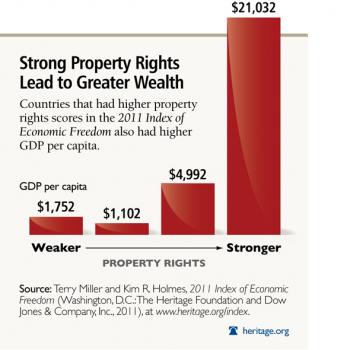Most Recent News


Popular News




What is the value of property rights? Why are property rights an important topic in economics and politics? Should we safeguard this right?

Before we answer that, I have to explain exactly what I mean by property rights. Property rights are:
We also need to consider a few other important caveats for the definition, including the following:
This obviously encompassing physical goods, but also has to include intellectual goods.
And they are important because:
Well-enforced property rights provide incentives for individuals to participate in economic activities, such as investment, innovation and trade, which lead to a more efficient market.
This can be exemplified by the development of property rights in Europe during the Middle Ages. During this epoch, political power was fully placed in hand of kings and hereditary monarchies, who often abused their power to exploit producers, impose arbitrary taxes, or refuse to pay their debts. The lack of protection for property rights provided little incentive for landowners and merchants to invest in land, physical or human capital, or technology.
After the Civil War of 1642 and the Glorious Revolution of 1688, shifts of political power away from the Stuart monarchs led to strengthening of property rights of both land and capital owners. Consequently, rapid economic development took place, setting the stage for Industrial Revolution.
Property rights are also believed to lower transaction costs by providing an efficient resolution for conflicts over scarce resources. Empirically, using historical data of former European colonies, Acemoglu, Johnson and Robinson find substantial evidence that good economic institutions – those that provide secure property rights and equality of opportunity – lead to economic prosperity.
On top of this, most economists tend to agree that private citizens make better use of capital than the government. Government intervention into markets tends to be less-than-stellar, whereas most of the tools and gadgets that have improved our living standards over time have been done by private entrepreneurs.
The allocation of property rights ensures that the incentive for those entrepreneurs and innovators to further progress remains intact.

The value of property rights in the consideration of economics is clear as day.
But property rights are also important safeguards against increasing governmental/institutional power and the tyranny that follows these controlling government systems. They provide a hedge against the political elite.
True property rights must ensure that the government cannot overtake private property without strong reason. It provides a legal basis for action against the government if they overstep their boundaries and chose not to serve but to control their citizenry.
Countries that safeguard property rights tend to have better:
This is why property rights are such a fundamental bedrock of Western civilization, and the progress it has attained.
And it is also why they must continually be protected.
Comments are closed.
(Learn More About The Dominion Newsletter Here)
Shared. Cheers!
Thank you for the share.